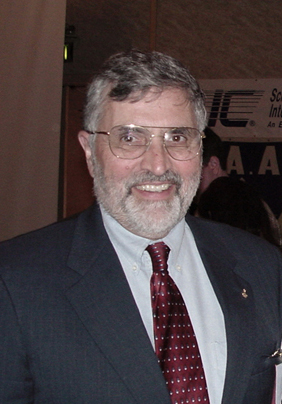Harrison Hagan Schmitt
From The Space Library
Contents |
Early Career
Harrison Hagan Schmitt, a native of Silver City, NM, has the diverse experience of a geologist, pilot, astronaut, administrator, businessman, writer, and U. S. Senator. Schmitt received his B. S. from Caltech, studied as a Fulbright Scholar at Oslo, and attended graduate school at Harvard. Geological field studies in Norway formed the basis of his Ph.D. in 1964. As a civilian, Schmitt received Air Force jet pilot wings in 1965 and Navy helicopter wings in 1967, logging more than 2100 hours of flying time.
NASA
Selected for the Scientist-Astronaut program in 1965, Schmitt organized the lunar science training for the Apollo Astronauts, represented the crews during the development of hardware and procedures for lunar surface exploration, and oversaw the final preparation of the Apollo 11 Lunar Module Descent Stage. He served as Mission Scientist in support of the Apollo 11 mission. After training as back-up Lunar Module Pilot for Apollo 15, Schmitt flew in space as Lunar Module Pilot for Apollo 17 – the last Apollo mission to the moon. On December 11, 1972, he landed in the Valley of Taurus-Littrow as the only scientist and the last of 12 men to step on the Moon.
United States Senate
In 1975, after two years managing NASA’s Energy Program Office, Schmitt fulfilled a long-standing personal commitment by entering politics. Elected in 1976, he served a six-year term in the U.S. Senate beginning in 1977. Senator Schmitt, the only “natural scientist” in the Senate since Thomas Jefferson was Vice-President of the United States and President of the Senate, worked as a member of the Senate Commerce, Banking, Appropriations, Intelligence, and Ethics Committees. In his last two years in the Senate, Schmitt held the position of Chairman of the Commerce Subcommittee on Science, Technology, and Space and of the Appropriations Subcommittee on Labor, Health and Human Services, and Education. He later served on the President’s Foreign Intelligence Advisory Board, the President’s Commission on Ethics Law Reform, the Army Science Board, as Co-Chairman of the International Observer Group for the 1992 Romanian elections, and as Vice Chairman of the U.S. delegation to the 1992 World Administrative Radio Conference in Spain. He is on the Maguire Energy Institute’s Board of Advisors, and served as co-chair of NASA’s Human Planetary Landing Systems Capabilities Road-mapping effort in 2004-05.
Return to NASA, Consulting, Corporate
Harrison Schmitt became Chairman of the NASA Advisory Council in November 2005, and served until October 2008. He led the Council’s deliberations on issues related to Aeronautics, Audit and Finance, Biomedicine, Exploration (human flight systems development), Human Capital, Science, and Space Operations. He also consults, speaks, and writes on policy issues of the future, the science of the Moon and Planets, history of space flight and geology, space exploration, space law, climate change, and the American Southwest. He presently is Chair Emeritus of The Annapolis Center (risk assessment) and is Adjunct Professor of Engineering, University of Wisconsin-Madison, teaching “Resources from Space.” Schmitt became a consultant to the Fusion Technology Institute at the University of Wisconsin in 1986, advising on the economic geology of lunar resources and the engineering, operational, and financial aspects of returning to the Moon. He is on the staff of the Institute for Human and Machine Cognition of Pensacola, Florida. Current board memberships include Orbital Sciences Corporation, Edenspace Systems Corporation, PhDx Systems, Inc., and The Heartland Institute, and, as a retired Director, he continues as an emeritus Member of the Corporation of the Draper Laboratory. He also has served as a member of the Energy Department’s Laboratory Operations Board. In 1997, Schmitt co-founded and became Chairman of Interlune-Intermars Initiative, Inc., advancing the private sector’s acquisition of lunar resources and Helium-3 fusion power and clinical use of medical isotopes produced by fusion-related processes. He is the author of “Return to the Moon” (Springer-Praxis, 2006) that describes a private enterprise approach to providing lunar helium-3 fusion energy resources for use on Earth.
Awards and Honors
Schmitt’s honors include the 1973 Arthur S. Fleming Award; 1973 Distinguished Graduate of Caltech; 1973 Caltech Sherman Fairchild Scholar; 1973 Manned Spacecraft Center Superior Achievement Award; 1973 NASA Distinguished Service Award; 1973 First Extraterrestrial Field Geologist Award of the Geological Society of America; 1977 Fellow of the AIAA; Honorary Member of the American Association of Petroleum Geologists, Norwegian Geographical Society, New Mexico Geological Society, and Geological Association of Canada; 1981 Engineer of the Year Award from the National Society of Professional Engineers; 1981 National Security Award; 1982 Public Service Award of the American Association of Petroleum Geologists; 1989 Lovelace Award (space biomedicine); 1989 G. K. Gilbert Award (planetology); 2002 Aviation Week Legend Award; 2008 American Association of State Geologists Pick and Gavel Award; and Honorary Fellow of the Geological Society of America; American Institute of Mining, Metallurgical and Petroleum Engineers; and Geological Society of London. Dr. Schmitt has been inducted into the Astronaut Hall of Fame and the International Space Hall of fame and has received honorary degrees from eight U.S. and Canadian Universities. In recognition of past service, the U.S. Department of State in July 2003 established the Harrison H. Schmitt Leadership Award for U.S. Fulbright Fellowship awardees. He also traveled in Europe in 2009 as a Speaker and Specialist for the State Department. In 2007, Schmitt was awarded the first Eugene M. Shoemaker Memorial Award by Arizona State University and is the first recipient of the National Space Society’s Gerard K. O’Neill Memorial Space Settlement Award. He recently has been awarded the 2010 inaugural Columbia Medal by the Aerospace Division of the American Society of Civil Engineers.
Books by Harrison Schmitt
Buy This Book Click here |
Audio
Click here to listen to Harrison Schmitt during Apollo 10 Press Conference.
Click here to listen to Harrison Schmitt during Apollo 10 Press Conference.
Click here to listen to Harrison Schmitt during Apollo 15 Geology Press Conference.
Click here to listen to Harrison Schmitt interview with Voice of America November 1972.
Website



